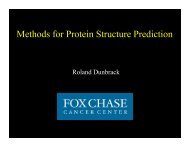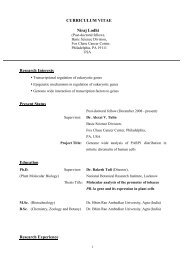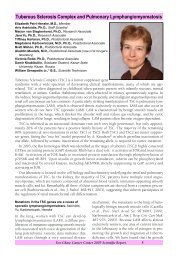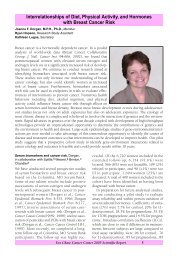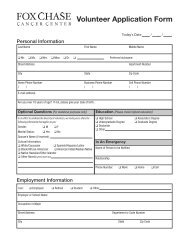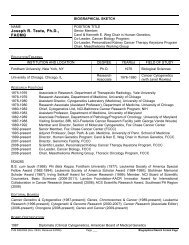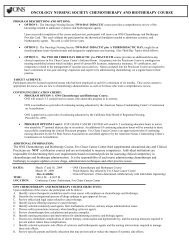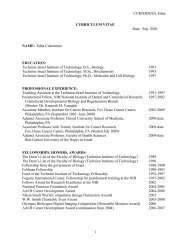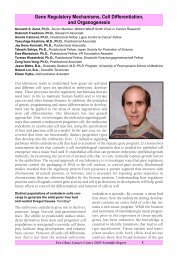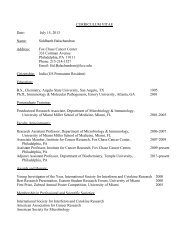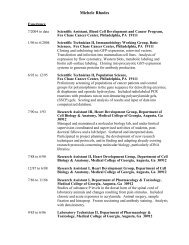Summer 2006 - Fox Chase Cancer Center
Summer 2006 - Fox Chase Cancer Center
Summer 2006 - Fox Chase Cancer Center
Create successful ePaper yourself
Turn your PDF publications into a flip-book with our unique Google optimized e-Paper software.
Proteomics Ovarian <strong>Cancer</strong> Study Hopes to Reveal Biologic “Fingerprint”<br />
<strong>Fox</strong> <strong>Chase</strong> <strong>Cancer</strong> <strong>Center</strong><br />
researchers are seeking women<br />
who recently have been treated<br />
for ovarian cancer to participate<br />
in a nationwide effort to find a<br />
biologic “fingerprint” of ovarian cancer<br />
using a technology called proteomics.<br />
Proteomics is the study of protein<br />
patterns in blood or other tissues used to<br />
determine cancer probabilities. In a previously<br />
published study, researchers used<br />
proteomics to successfully differentiate<br />
blood samples from women with and<br />
without ovarian cancer. In this new study<br />
sponsored by the National <strong>Cancer</strong><br />
Institute, researchers from <strong>Fox</strong> <strong>Chase</strong> and<br />
11 other U.S. institutions will begin the<br />
process of validating the earlier study,<br />
which used stored specimens.This new<br />
study will be a prospective clinical trial.<br />
“Proteomics offers significant hope as<br />
a cancer diagnostic tool, but while the<br />
earlier study appears promising, the<br />
results must be validated,” explains Mary<br />
B. Daly, senior vice president of population<br />
science and co-investigator of the<br />
study at <strong>Fox</strong> <strong>Chase</strong>.“To do this, we’ll begin<br />
studying proteomics using blood from<br />
women who have had ovarian cancer to<br />
see if we can identify a specific protein<br />
pattern in those women whose cancers<br />
may later recur.” More than 80 percent of<br />
advanced-stage epithelial cancer patients<br />
relapse after attaining a clinical remission<br />
with standard therapy.<br />
Last year, <strong>Fox</strong> <strong>Chase</strong> <strong>Cancer</strong> <strong>Center</strong>,<br />
the site of a National <strong>Cancer</strong><br />
Institute Specialized Program of<br />
Research Excellence (SPORE) in<br />
prevention, diagnosis and<br />
treatment of ovarian cancer, hosted a<br />
workshop for ovarian cancer researchers<br />
and patient advocates.The goal of the<br />
workshop was to identify and develop the<br />
role of patient advocates in the SPORE.<br />
“Fighting cancer <strong>Cancer</strong> is all All we We do. Do, All day. Day, Every day.” Day.”<br />
Researchers say proteomics offers the<br />
future hope of allowing doctors to diagnose<br />
cancer at an early stage, when it is most<br />
curable. In addition, proteomics could allow<br />
physicians to diagnose ovarian cancer<br />
without the need for a biopsy or surgery.<br />
Surgical removal of the ovaries is<br />
currently the only way to diagnose ovarian<br />
cancer. Before a new blood test can be<br />
offered as a way to detect ovarian cancer,<br />
it must be confirmed that there is a<br />
pattern of proteins specific to ovarian<br />
cancer.Any test for ovarian cancer must be<br />
proven to be reliable and dependable so<br />
that women do not get needless surgeries<br />
because of a false-positive result.<br />
The clinical trial also is open to<br />
women who have had peritoneal and<br />
<strong>Fox</strong> <strong>Chase</strong> is the only center in<br />
Pennsylvania and the first of only two<br />
facilities on the entire East Coast to receive<br />
a SPORE grant for ovarian cancer. NCI<br />
SPORE grants support innovative, multidisciplinary<br />
research approaches that potentially<br />
have an immediate impact on improving<br />
cancer care and prevention.<br />
The SPORE grant funds <strong>Fox</strong> <strong>Chase</strong><br />
research projects that focus on translating<br />
basic research findings from the laboratory<br />
to clinical settings.The goal of this “translational”<br />
research is to discover methods of<br />
earlier detection and improved prevention<br />
and treatments for this deadly disease.<br />
The ovarian cancer workshop at <strong>Fox</strong><br />
<strong>Chase</strong> was led by Deborah Collyar,<br />
director of Patient Advocate Research<br />
Team (PART) Programs. Collyar assists<br />
institutions with SPORE grants in<br />
establishing effective collaborations with<br />
cancer patient advocates to develop local<br />
PARTs.<br />
April Donahue of Philadelphia is<br />
the first PART member at <strong>Fox</strong> <strong>Chase</strong>.<br />
“By holding the workshop, <strong>Fox</strong> <strong>Chase</strong><br />
has truly shown its commitment to having<br />
patients involved in research from all<br />
aspects and they’ve taken their patient<br />
advocate program to the next level,” said<br />
Donahue, who also serves on the board of<br />
fallopian tube cancers because the biology<br />
of these cancers is similar to ovarian<br />
cancer. Women in the study must have<br />
had stage III or IV disease at diagnosis and<br />
must have completed initial standard<br />
treatment within 12 weeks of enrolling in<br />
the proteomics study. Participants will be<br />
asked to give blood every three months<br />
for four years (unless the disease recurs).<br />
The results of blood tests will not be given<br />
to the participants because an accurate<br />
protein pattern for ovarian cancer has yet<br />
to be determined.<br />
Researchers nationwide hope to enroll<br />
400 women in this study. Physicians will<br />
monitor all women for recurrent disease<br />
in the same way as those who are not on<br />
this study, and no anti-cancer treatment<br />
will be offered unless a cancer has<br />
recurred (as determined by current tests<br />
including a CT scan, CA-125 blood test or<br />
physical exam). There is no standard<br />
screening available for the disease.<br />
<strong>Fox</strong> <strong>Chase</strong>’s Specialized Program of<br />
Research Excellence (SPORE) in Ovarian<br />
<strong>Cancer</strong> is funding the study. <strong>Fox</strong> <strong>Chase</strong> is<br />
one of a select few institutions in the U.S.<br />
to receive an ovarian cancer SPORE grant<br />
from the National <strong>Cancer</strong> Institute (NCI).<br />
The NCI-designed SPORE grants support<br />
innovative, multidisciplinary research<br />
approaches that potentially may have an<br />
immediate impact on improving cancer<br />
care and prevention.<br />
Patient Advocates Join Ovarian <strong>Cancer</strong> Research Team at <strong>Fox</strong> <strong>Chase</strong><br />
An ovarian cancer workshop was hosted<br />
at <strong>Fox</strong> <strong>Chase</strong> to identify and develop the<br />
specific role of patient advocates in its<br />
Specialized Program of Research<br />
Excellence for ovarian cancer. Patient<br />
advocates Karen Mason (from left) and<br />
April Donahue teamed with Deborah<br />
Collyar, director of Patient Advocate<br />
Research Team Programs.<br />
<strong>Fox</strong> <strong>Chase</strong> is the only<br />
institution in the tri-state<br />
area participating in this<br />
NCI-sponsored study. For<br />
additional information,<br />
please call 215-728-3672.<br />
directors for the National Ovarian<br />
<strong>Cancer</strong> Coalition.“The open dialogue<br />
between researchers, doctors and patient<br />
advocates allowed us to brainstorm and<br />
develop plans to move our translational<br />
research forward.The atmosphere of the<br />
workshop was very relaxed and the advocates<br />
felt comfortable sharing their ideas<br />
to help the team of researchers.”<br />
“To have the face, thoughts and<br />
opinions of patients in front of the<br />
researchers can be nothing short of a<br />
win-win situation,”said Karen Mason, an<br />
ovarian cancer survivor and a member of<br />
<strong>Fox</strong> <strong>Chase</strong>’s PART program.<br />
The <strong>Fox</strong> <strong>Chase</strong> researchers and the<br />
PART plan to meet quarterly.<br />
“Patient advocates offer fresh ideas<br />
about research and recruitment, and<br />
voice patient concerns,” said Robert F.<br />
Ozols, principal investigator of the<br />
ovarian SPORE at <strong>Fox</strong> <strong>Chase</strong> <strong>Cancer</strong><br />
<strong>Center</strong>.“Karen Mason and April Donahue<br />
have been steadfast supporters of ovarian<br />
cancer research at <strong>Fox</strong> <strong>Chase</strong> for years and<br />
we’re pleased to have an opportunity to<br />
capitalize on our relationship. Their<br />
contributions are extremely valuable.”<br />
The PART program is supported by<br />
grants from Avon and the National <strong>Cancer</strong><br />
Institute.<br />
ISSUE 2 5



